#Many of whom have been arrested in the process
Photo
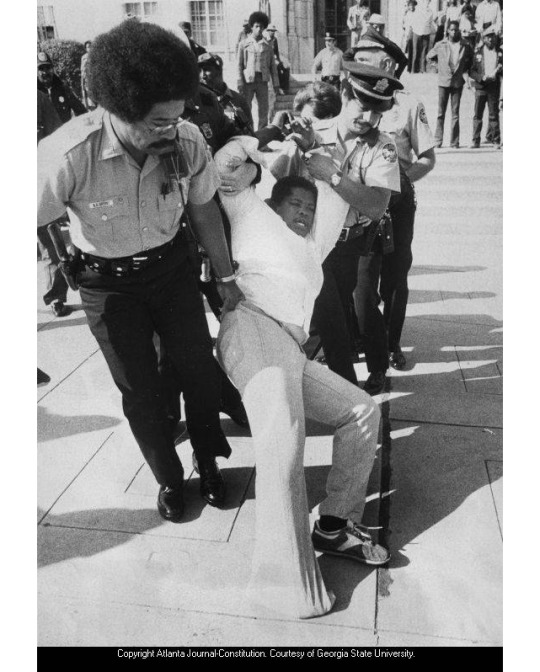
On this day, 28 March 1977, over 1,300 mostly Black sanitation workers in Atlanta walked off the job for a 50 cent an hour pay increase. The city's first Black mayor, Maynard Jackson, who had come to power on the back of the civil rights and Black power movements and to whom the workers looked for support, sacked them all. Business leaders, white and Black-owned newspapers, churches and even many former civil rights leaders supported the mayor. Martin Luther King Sr (not to be confused with MLK Jr, who was assassinated while supporting a strike of sanitation workers) strongly supported the firings, saying: “fire the hell out of them.” The workers were replaced with scab replacements, but the strikers fought on, setting up picket lines around the city, fighting with strikebreakers and police, and dumping rubbish on the steps of city hall. But Jason Schultz argues in his analysis of the strike that the "union also could not ideologically defeat the city bosses for Jackson had already painted them as run by greedy, white Northerners bent on driving the city bankrupt while making the city’s first Black mayor look bad in the process. Civic pride among everyday Black folks was a major reason they rallied around their mayor, protecting him against a perceived outside threat. This spelled doom for Black sanitation workers seeking broad popular support." Eventually the workers were forced to return and reapply for their jobs in defeat, some of them at lower wages, and by the end of the year most of the strikers had been rehired. To some activists, it was an early lesson that having representatives of colour did not necessarily benefit working class people of colour. More information, sources and map: https://stories.workingclasshistory.com/article/10035/atlanta-sanitation-workers-sacked Pictured: a strike of being arrested by police https://www.facebook.com/workingclasshistory/photos/a.296224173896073/2239360396249098/?type=3
222 notes
·
View notes
Text
Presently, [...] [a] scholar doing [...] expansive work on the relationship between disability and incarceration is Liat Ben-Moshe. Ben-Moshe has produced two books on the subject within the past ten years: Disability Incarcerated: Imprisonment and Disability in the United States and Canada (2014), and Decarcerating Disability: Deinstitutionalization and Prison Abolition (2020).
Disability Incarcerated is an edited collection that surveys the various iterations and sites of historical carcerality vis-à-vis disabled people: asylums, mental hospitals, state institutions, migrant detention centers, prisons, nursing homes, segregated schools and workshops. It is an accessible overview [...]. Decarcerating Disability, in contrast, is singularly authored by Ben-Moshe; it is an interesting attempt at utilizing the experience of disability incarceration and decarceration [...] in order to impart lessons and considerations of relevance to the present-day abolition movement.
---
Ben-Moshe’s Decarcerating Disability is unique in its explicit positioning within the framework of prison studies and the abolitionist movement; it is, in fact, a polemical intervention into living debates. [...] Ben-Moshe also writes about the importance of centering “fugitive/maroon abolitionist knowledges” in advancing critical analyses of carcerality. [...]
[S]ubjugated knowledges are “blocks of historical knowledges” that have been subsumed by “formal systematization”; that is, “ways of knowing” that have been dismissed, disqualified, or shunned by the hegemonic arbiters of reason. In this schema, power “is not a centralized external force controlled by a limited few,” writes Ben-Moshe, “but is inside us, making us operate in particular ways, often by benevolent means, that is, ‘for our own good,’ such as is the case with diets, psychotherapy, [...] and rehabilitation, to name a few examples.” [...]
Foregoing criticisms notwithstanding, Decarcerating Disability is a useful and welcome text insofar as it actively engages with the process of “letting go of hegemonic knowledge (of crime, of corrections and the dangerous few, for example).”
On a practical level, Ben-Moshe articulates responses to many of the common questions that abolitionists face, including: what to do about interpersonal or community safety; are non-carceral solutions practicable; why are certain people and behaviors criminalized; and, in the words of Angela Davis, what kind of “social landscape” would non-carcerality necessitate and entail. [...]
---
Since reaching a high-point in the late 2000s, the overall rate of [formal prison] incarceration has been [technically] declining [...]. This, however, should be kept in perspective -- the United States still remains the world’s leader in youth criminalization, with nearly 700,000 youth arrested annually (almost 10 percent of whom are arrested in schools) and over 43,000 youth incarcerated on a given day. [...] [T]he lessons of the previous example of decarceration counsel caution and vigilance. Ben-Moshe argues that deinstitutionalization with regard to physical space and locale has largely been a success; but insofar as deinstitutionalization was not accompanied by a widespread rejection of the paradigm and logic of coercive, carceral “solutions” to disability writ large, institutional and carceral regimes of marginalization have cropped up and even expanded within the vacuums left by the previous large state-run facilities:
Today those who were discharged or never institutionalized are still under the surveillance of the . . . state, but it has furthered its reach -- adhering to strict drug regimens, living in semi-institutions (group homes, halfway houses), and subjected to a variety of outpatient commitment laws and policies.
---
All text above by: Keith Rosenthal. “Jailbreak of Disability.” Rampant Magazine. 30 August 2021. [Bold emphasis and some paragraph breaks/contractions added by me.]
150 notes
·
View notes
Text
It’s really funny when you think of season 4 basically being a tragicomedy where two fruity disasters are engaged in a dance of who can miscommunicate the most. They both are actually on the same page with a desire to go crazy together and be a team but they assume the other boy is reading an entirely different book. Mike goes to Cali frazzled with a million chaotic thoughts, his confusion and flustered heart barely concealed by his Big Bird core outfit.

I have a girlfriend and I’m supposed to love her. Of course I love her, she’s my girlfriend! She’s El! She has superpowers! She’s changed my life! Yes, stick to the script! I can’t wait to meet her friends she’s been telling me about and also to meet Will 😍. Wait, why did I just get flustered? It’s just Will. My friend. Will Byers. WHO HAS APPARENTLY BEEN MAKING A PAINTING FOR A MYSTERIOUS GIRL?!? I wonder what that’s about. Actually I don’t wanna know. It’s fine. Oh my God, he got hot. Why did he get hot? Wait, don’t think that. That’s weird. He’s a boy. He’s Will. Act calm. Be normal. Uhhh. hi 😍 😍😍 Wait, why isn’t he showing me that? Does he hate me? Of course he does. Why wouldn’t he?


Meanwhile Will, with no idea about Mike’s internal monologue, is extremely eager and happy to see his best friend again and is utterly confused why he is being so weird and not hugging him and why his outfit is so questionable. I guess he doesn’t care about anything I have to say anymore. I’m so stupid. Why did I make this painting and bring it to this airport like a loser? He doesn’t want to see it. Which is literally the opposite of the truth. And then things start happening too fast to process anything, and everyone’s talking fast, and El is flagrantly lying to Mike and it’s quite disturbing. Why would she do that? Friends don’t lie. This can’t end well.

And then at the roller rink Will is in tragic yearning mode while also keenly aware that a fire is brewing and wanting to put out the fire before it hurts both his sister and his best friend, both of whom he loves dearly. But Mike is oblivious to all of this while in his feelings about Will, paying absurdly close attention to Will “moping and rolling his eyes,” interpreting things in the wrong way. And then he shoots up like a gopher on adderall when Will tells him they need to talk about El because something is terribly wrong- which would be crystal clear if Mike wasn’t hyperfocused on Will’s every mood swing- and he refuses to believe it until it becomes undeniable, choosing instead to address what is clearly on his mind significantly more than his actual girlfriend on a theoretical date. And they have a high school musical coded fight in the middle of the building, entirely misunderstanding where the other boy is coming from, and it just leaves them more flustered, frustrated, and confused. But because they are incapable of personal space, it doesn’t make them drift apart physically. They stand side by side as El absolutely decks Angela to Will’s shellshocked sinking feeling of “This is my fault. I should have prevented this from happening,” and Mike’s feeling of horror and shock and, “Where did any of this come from? I just got here.”

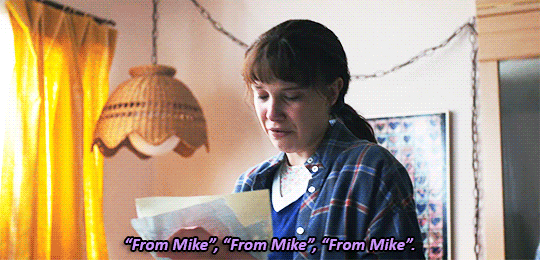
And then later on El and Mike have their fight about him not being able to say I love you, which is confusing and full of gaslighting and contradictions and is super messy no matter how the cake is sliced, but Will is not there for any of this, so he has no reason to believe El and Mike are on the rocks. Because why would they be? He heard Mike say I love you to a room full of their friends a year ago. And Mike is clearly dealing with so many internal thoughts and conflicted feelings that he won’t share with the class- with the class being both Will and the audience- so post el’s arrest and post her “superhero” journey we have to watch Byler have these incredibly coded conversations that get increasingly more chaotic. Mike’s basically like, “Yeah bestie I’m not sure about this whole macaroni and cheese thing and I don’t know if me and El are really right for each other, you know? It was prolly like dumb luck or something, but you’re the greatest thing that’s ever happened to me, Will, and I think we should work together as a team, as best friends, as lovers- wait, who said that? Anyway, what do you think, my totally platonic bestie?”
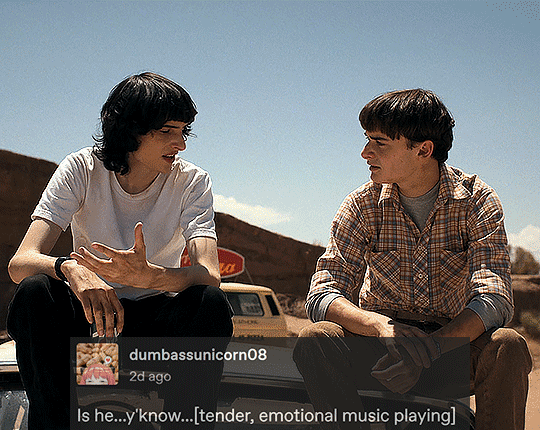
All this as [tender, emotional music] plays. And Will, even though it destroys him inside, is extraordinarily selfless, and is basically like, “I’m sure you and El will work things out and talk through whatever’s happening. You love each other. You are perfect for each other. And I will always be here to reassure you.” And Mike’s like, “That’s not how I envisioned this convo going. Are you sure?” And while holding back tears, Will’s like, “Of course I’m sure! Why wouldn’t I be sure? Look at this painting I made you.” And Mike’s like “Wow 😍😍😍 did you make that for me?” And Will’s like, “Sure did! Actually El basically did. She commissioned it.” And Mike is like, “Oh. Okay. It’s still really beautiful tho. Which of course it is. Because you made it. But I… I’m confused. But I don’t fully understand why I’m confused. I’m glad El needs me! I think?”
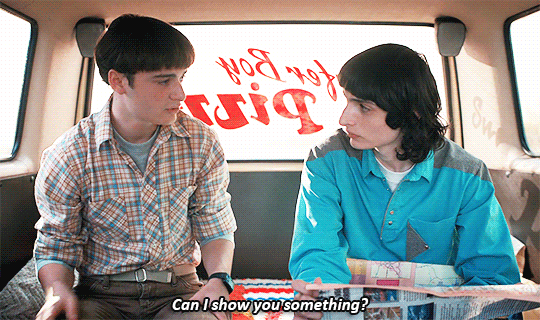
Meanwhile, Byler literally wants the same things, they both deeply desire and love each other, but they don’t know how the other feels. And if they both paused for one second, were fully honest with each other, and stopped speaking in code, things would fall into place. And they could walk hand in hand, crazy together, into the apocalypse.

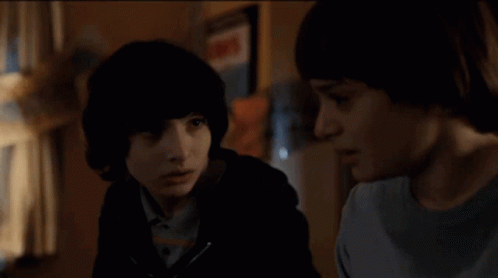
128 notes
·
View notes
Text
THIS DAY IN GAY HISTORY
based on: The White Crane Institute's 'Gay Wisdom', Gay Birthdays, Gay For Today, Famous GLBT, glbt-Gay Encylopedia, Today in Gay History, Wikipedia, and more … March 28



1921 – Dirk Bogarde, English actor was born (d.1999); Sir Derek Jules Gaspard Ulric Niven van den Bogaerde, better known by his stage name Dirk Bogarde, was an actior and author.
Bogarde served in World War II, being commissioned into the Queen's Royal Regiment in 1943. He reached the rank of captain and served in both the European and Pacific theatres, principally as an intelligence officer. Taylor Downing's book "Spies in the Sky" tells of his work with a specialist unit interpreting aerial photo-reconnaissance information, before moving to Normandy with Canadian forces.
Bogarde claimed to have been one of the first Allied officers in April 1945 to reach the Bergen-Belsen concentration camp in Germany, an experience that had the most profound effect on him and about which he found it difficult to speak for many years afterward. Some sources dispute his claim.
After the war his agent renamed him 'Dirk Bogarde' and his good looks helped him begin a career as a film actor, contracted to The Rank Organisation under the wing of the prolific independent film producer Betty Box, who produced most of his early films and was instrumental in creating his matinee-idol image.
Bogarde's most serious friendship with a woman was with the bisexual French actress Capucine.
For many years he shared his homes, first in Amersham, England, then in France with his manager Anthony Forwood (a former husband of the actress Glynis Johns and the father of her only child, actor Gareth Forwood), but repeatedly denied that their relationship was anything other than friendship. These denials were understandable, mainly given that homosexual acts were illegal during most of his career, and also given his following among female admirers which he was loath to jeopardize. His brother Gareth Van den Bogaerde confirmed in a 2004 interview that Bogarde was Gay at a time when such acts were illegal, and also that his long-term relationship with Tony Forwood was more than simply that of a manager and friend.
Bogarde starred in the landmark 1961 Victim, a remake of the 1919 German silent classic Different From The Others, playing a prominent homosexual barrister in London who fights the blackmailers of a young man with whom he had an emotional relationship. The young man commits suicide after being arrested for embezzlement, rather than ruining the attorney's reputation. In the process of exposing the ring of extortionists, Bogarde's character puts at risk his successful legal career and marriage to see that justice is served.
Victim was the first mainstream British film to treat the subject of homosexuality seriously and the film helped lead to the changing of the law. Before agreeing to play this role, which argued for the decriminalization of homosexual acts, Bogarde had specialized in playing leading men in light comedies.
"It was a tremendous departure, playing `my first queer,'" he wrote. "The fanatics who had been sending me 4,000 letters a week stopped overnight...not because I was playing a homosexual, but because I was playing a middle-age man."


1933 – American artist, filmmaker and legend, James Bidgood was born on this date in Madison, Wisconsin (d.2022). His artistic output has embraced a number of media and disciplines, including music, set and window design, and drag performance. In time his interests led him to photography and film and it is for this work that he is most widely known. Highly recognizable, his photographs are distinguished by an aesthetic of high fantasy and camp. His work which was inspired by an early interest in Florenz Ziegfeld, Folies Bergere and George Quaintance has, in turn, served as important inspiration for a slew of artists including Pierre et Gilles and David LaChapelle.
He directed the 1971 film Pink Narcissus, a dialogue-free fantasy centered around a young and often naked man. The film took seven years to make, and Bidgood built all the sets and filmed the entire piece in his tiny apartment. He later removed his name from the film because he felt editors had changed his original vision. Consequently, the film bore the word "Anonymous" for the director's credit, and it was misattributed to other directors such as Andy Warhol for many years.
Pink Narcissus was restored and re-released by Strand Releasing in 1999, and Bidgood began to receive recognition. "Bidgood created breathtaking camera movements, elaborate forest scenes, wild Persian fantasy sequences, and a neon netherworld," Ed Sikov wrote in The Advocate that year. Bidgood said he appreciated the attention, but he would rather have received it years earlier.
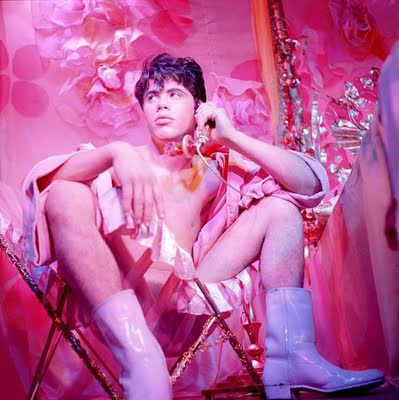
'Pink Narcissus' still
His work is characterized by a heavy reliance on invention. His photographs feature elaborate sets built ground up from the materials of the theater, fashion, design and fine art. In a profile of the artist published in Aperture, Philip Gefter writes,
"Necessity was the mother of invention for Bidgood, who created elaborate photographic tableaux in his small midtown Manhattan studio apartment. His first erotic series was an underwater epic called Water Colors, made in the early 1960s, in which he used a dancer from Club 82 named Jay Garvin as his subject. The underwater atmosphere is completely fabricated; the bottom of the ocean was created with silver lame spread across the floor of Bidgood's apartment; he made the arch of a cave out of waxed paper, and fashioned red lame into the shape of lobster. He coated Garvin with mineral oil and pasted glitter and sequins to his skin so the silver fabric under photographic lights would reflect on his body like water. For weeks at a time, Bigood would eat and sleep within the sets he constructed in his apartment."
Many contemporary themes are found even in the earliest of Bidgood's work. Camp, identity, erotics and desire, marginality, and performance all figure heavily in his portraits of nude men.
In 2005, James Bidgood was honored with a Creative Capital grant which facilitated a return to art photography after a hiatus of nearly forty years. His current projects include work for Christian Louboutin and OUT magazine. In 1999 The art book publisher Taschen published a monograph of his work including biographical images, stills from his film, and an interview with Bidgood in its 2008 publication The Big Penis Book, and will re-publish his monograph in 2009. His most recent work was featured in Out in February 2009.


1956 – Kevin Sessums has served as executive editor of Interview and as a contributing editor of Vanity Fair, Allure, and Parade. His work has also appeared in Travel+Leisure, Elle, Out, Marie Claire, Playboy, Thedailybeast.com and Towleroad.com. He was the founding Editor-in-Chief of FourTwoNine magazine (G-A-Y on the telephone keypad) and is currently the Editor at Large of the Curran in San Francisco. In 2007, he published a memoir titled Mississippi Sissy, which is about his conflicted life of a self-aware gay boy growing up in Forest, Mississippi. It made the New York Times Bestseller list and won the 2008 Lambda Literary Award for Best Male Memoir. His audio recording of Mississippi Sissy was nominated for a 2007 Quill Award. In 2015, he published his second memoir, I Left It on the Mountain, which made the New York Times Celebrity Bestseller List. He portrayed the character Peter Cipriani in the miniseries adaptation of Armistead Maupin’s Tales of the City.
Sessums was banned from posting on Facebook for 24 hours on December 29, 2016 after he accurately compared the supporters of President-elect Donald Trump to a "nasty fascistic lot" in a post.
Sessums is HIV positive.


1976 – Angelo Garcia, born in Brooklyn, New York City, is an American singer of Puerto Rican descent and songwriter who was a member of Puerto Rican boy band Menudo from 1988 to 1990.
A native New Yorker born in Brooklyn, New York, he barely spoke Spanish when he auditioned for a spot in the band after seeing a television commercial in Puerto Rico during a family vacation.
After two years with Menudo, García parted with the band and signed on with World Wide Entertainment as a solo artist he recorded several songs including "Magic", "Yours So Completely", and a remake of singer Tiffany's hit song "Could've Been" but it was his single "Don't Keep Me Holding On" that became a success.
After parting with his former label, he released one semi-successful Spanish album for Warner simply titled Angelo. After completing his secondary education and some music projects, he put his recording career on hold after he moved to Orlando, Florida, where he earned a communications degree from the University of Central Florida. After completing his studies, he helped in the launch of a women's gym franchise in Miami called Elements, before returning to New York City to restart his musical career.
During 2005, he participated in a reunion tour of former Menudo members Sergio Blass, Rawy Torres, and Robert Avellanet, performing under the name "Los Ultimos Heroes."
In 2006, García released a Spanish-language pop album titled Cool for which he wrote or co-wrote every song.
In May 2010, García posed for a series of semi-nude photographs for Paragon Men, a gay erotica website. In the interview which accompanied his photo shoot, Garcia openly discussed his homosexuality and his years of sexual self-exploration after leaving Menudo, even working briefly as a stripper and erotic dancer and performing at the now defunct Gaiety Theatre in New York City. He also refused to "out" his former bandmate Ricky Martin, who publicly disclosed his homosexuality a few weeks after García's interview.
In 2012, Garcia joined forces with William Luque (who wrote his first Spanish hit "En Mis Sueños" which sold over 6 million copies worldwide) and began writing and recording a new English language dance-pop album in Madrid called Scandalous. The title track "Scandalous" speaks about a child growing up in the spotlight and how having to grow up prematurely wreaked havoc on his adult life.
On May 7, 2015 Angelo Garcia disclosed in an exclusive interview on the Dr. Zoe Today show that he was sexually abused by a neighbor at 8 years old; by someone close to administration while in Menudo (band) from 11 years old to 14 years old; and again by a schoolteacher after he left the band. Inspired by the overwhelming response to his interview, the show opened their toll free number for listeners to call in sharing their own stories of sexual abuse and aired them on the following show titled, "Breaking the Silence" on May 14, 2015.
In an appearance on Tosh.0 he has stated that he now considers himself Bi-Sexual.


1986 – Stefani Joanne Angelina Germanotta, best known by her stage name Lady Gaga, is an American singer-songwriter and musician. She got her stage name from the song "Radio Ga Ga" by the band Queen. In 2008, she made an album called, The Fame, and she tells us "about how everyone can feel famous." Lady Gaga has a contralto vocal range. Her other albums are The Fame Monster and Born This Way. She has won various Grammys and BRIT Awards.
Gaga says much of her early success is thanks to her gay fans and is often called a "rising gay icon." Early in her career she had trouble being played on the radio, and stated, "The turning point for me was the gay community. I've got so many gay fans and they're so loyal to me and they really lifted me up. They'll always stand by me and I'll always stand by them. It's not an easy thing to create a fanbase."
In the inside of her album The Fame, she said, "I love you so much. You were the first heartbeat in this project, and your support and brilliance means the world to me. I will always fight for the gay community hand in hand with this incredible team."
One of her first performances on television was in May 2008 at the NewNowNext Awards, an awards show on the LGBT television network Logo, where she sang her song "Just Dance". In June, she sang the song again at the San Francisco Pride event. After The Fame came out, she said the hit song "Poker Face" was about being bisexual.
When she was a guest on The Ellen DeGeneres Show in May 2009, she complimented DeGeneres for being "an inspiration for women and for the gay community". She later said that the October 11, 2009, National Equality March rally on the national mall was "the single most important event of her career." As she left, she said "Bless God and bless the gays," similar to her 2009 MTV Video Music Awards speech a month earlier.
At the rally, she sang a cover of John Lennon's "Imagine" saying "I'm not going to [play] one of my songs tonight because tonight is not about me, it's about you." She changed the lyrics of the song to talk about the death of Matthew Shepard, a college student murdered because of his homosexuality.
In September 2010, she spoke at a rally in favor of removing the Don't ask, don't tell policy, which stopped LGBT people from working openly in the military of the United States. The gay magazine The Advocate said that she had become an important helper for gays and lesbians where President Barack Obama wasn't.
Gaga released "Born This Way" on February 11, 2011. The song, the lead single from the eponymous album, debuted atop the Billboard Hot 100, becoming the 1,000th number-one single in the history of the charts.


1987 – Jonathan Van Ness, also commonly referred to by his initials, JVN, is an American hairdresser, podcast host, activist, actor, author, and television personality. He is best known as the grooming expert on the Netflix series Queer Eye, for his work on the web series parody Gay of Thrones, and for hosting the Getting Curious with Jonathan Van Ness podcast.
Jonathan Van Ness was born and raised in Quincy, Illinois. Van Ness said he comes "from a family of journalists," being the sixth generation of their family-owned newspaper. This refers to broadcast and newspaper conglomerate Quincy Media and the company's local flagship newspaper, the Herald-Whig; Van Ness' mother is the vice president of Quincy Media, and he is a descendant of the Oakley family which has controlled the company since the 1890s.
Openly gay throughout his life, Van Ness experienced bullying for his "femininity and natural flamboyance," and received death threats. He "endured years of judgment, ridicule, and trauma." Of the time, Van Ness said, "Growing up I definitely put on every nail polish, every heel, every scarf – I definitely had my mom's knockoff Hermès scarves in my hair and around my waist – those were my skirts, and I loved it.… But when I was really young, I had really femme-shamey, gender-shamey [reactions] when I would dress like that. When I would play with those things, I knew it needed to be…... behind closed doors."
Although always comfortable in his own skin, he says it did take some time to navigate other people's reactions. In response to the bullying he used humor as a coping mechanism, and relied on a small group of close friends for support. Years later, in the late 2010s, he realized he was gender non-conforming, and non-binary.
When he was younger, he was sexually abused by an older boy at church, and Van Ness said this laid the foundation for self-destructive behaviors. In his early teens, he used online-chat to socialize with, and sometimes meet older men for sex. He was the first male cheerleader at Quincy Senior High School and continued cheerleading in college at the University of Arizona, where he majored in political science. One month in his initial semester at college, he used up his monthly allowance on cocaine and, too embarrassed to ask his parents for funds, turned to sex work. His addictions to sex and drugs increased to also include methamphetamine. His grades fell and he lost his cheerleading scholarship. He dropped out after one semester to pursue hairstyling.
In Los Angeles, Van Ness found a job as a personal assistant at Sally Hershberger Salon. One day in 2012, at age 25, he fainted in the salon while doing highlights for a client's hair. Later at a clinic, he found out he was HIV-positive. He used the revelation to "get clean" from drug use and publicly shared his story, saying, "I want people to realize you’re never too broken to be fixed." He currently works at MoJoHair and Stile Salon, both in Los Angeles, which he co-founded with Monique Northrop of Arte Salon in New York City.
On June 23, 2020, Van Ness and Queer Eye costar Bobby Berk praised recent U.S. Supreme Court decisions that ruled that LGBT employment discrimination was a violation of the Civil Rights Act of 1964. Van Ness described the ruling as "a great step in the right direction." However, both of them still urged the United States Congress to pass the proposed Equality Act.


1988 – Austin Armacost is an American reality television personality who rose to fame in 2010 by becoming a cast member in the Logo reality television series The A-List: New York which followed the lives of six gay and bisexual men in New York City.
In 2015, he competed in the sixteenth series of Celebrity Big Brother, where he became runner-up. He re-entered the house in 2017 during the nineteenth series as an "All Star" in which he was the second to leave the house. He was evicted in a twist, which saw him voted as the "dullest housemate". He finished in fifteenth place.
Armacost was married to a British man named Jake Lees for eight years. They separated in 2016. Austin celebrated his one-year anniversary with new boyfriend, IT Business Architect Darren Banks in September 2017.


1989 – 2500 ACT-UP activists demonstrate at the New York City hall protesting Mayor Koch’s handling of the AIDS crisis. Over 100 protestors went to jail.


12 notes
·
View notes
Text
The Norwood Builder pt 1
Definitely remember the name, but do I remember the story? That is the eternal question. Well, hopefully not eternal. It should be answered soonish.
“London has become a singularly uninteresting city since the death of the late lamented Professor Moriarty.”
Woe, my arch enemy who tried to kill me and very nearly succeeded several times (but who only appeared in one story) is dead. I don't know if this is more indicative of Holmes' character or ACD's lamenting 'look, I raised the stakes so high that time that I'm never going to be able to do that again'. Probably both.
“The community is certainly the gainer, and no one the loser, save the poor out-of-work specialist, whose occupation has gone."
Watson has literally told us twice that 1895 was insanely busy for you. You did a case for the pope. You dealt with that canary guy. Your melodrama is noted, sir.
At the time of which I speak Holmes had been back for some months, and I, at his request, had sold my practice and returned to share the old quarters in Baker Street. A young doctor, named Verner, had purchased my small Kensington practice, and given with astonishingly little demur the highest price that I ventured to ask—an incident which only explained itself some years later when I found that Verner was a distant relation of Holmes's, and that it was my friend who had really found the money.
Holmes really Did That, huh? Wow. Guy has no chill in so many ways. "Come and live with me, Watson, and give up your practice! I'm sure you'll find someone to take it on. What's that? A convenient buyer of whom I know nothing. Nothing at all. Any family resemblance is purely coincidental!"

As it opened there came a tumultuous rush into the hall, rapid feet clattered up the stair, and an instant later a wild-eyed and frantic young man, pale, dishevelled, and palpitating, burst into the room.
What does 'palpitating' mean when referring to a human person?
Ah, so just sort of shaking, then. I've never seen it used like that.
He became conscious that some apology was needed for this unceremonious entry.
I mean, he just entered the dramatic bitch house dramatically, I'm not sure he needs to apologise. You and Holmes do worse once a day and twice on Sundays. Let the boy be dramatic. He's probably earned it. He fits right in, anyway.
"I am the unhappy John Hector McFarlane.”
Once again, I see this and my brain immediately asks if there's a 'happy John Hector McFarlane' out there somewhere, just living his best life, not even palpitating slightly.

“I am sure that with your symptoms my friend Dr. Watson here would prescribe a sedative."
I'm sure he would rather prescribe brandy.
...it was not difficult for me to follow his deductions, and to observe the untidiness of attire, the sheaf of legal papers, the watch-charm, and the breathing which had prompted them.
OK, so Watson's doing really well at working out Holmes' thought processes from his conclusions.

But also, Freemasons really just walking around with their secret society symbol hanging from their watch chain? How is that a secret society?
"I am the most unfortunate man at this moment in London. For Heaven's sake don't abandon me, Mr. Holmes!"
Srsly, my boy is dramatic and he has found his people.
“Arrest you!” said Holmes. “This is really most grati—most interesting.”
Good cover. A+. No one noticed a thing.
“Here it is, and with your permission I will read it to you."
Odd decision to read the article rather than telling your own version of events. But I do love a dramatic reading.
And Watson, you're a bit slow with that brandy. Where is your medical expertise, did you sell it along with your practice to Sherlock's cousin?
"He has had the reputation of being a man of eccentric habits, secretive and retiring. For some years he has practically withdrawn from the business, in which he is said to have amassed considerable wealth."
How very Bilbo Baggins of him. This smells like a motive. I wonder if he has Sackville-Oldacre relatives.
"The police theory is that a most sensational crime has been committed, that the victim was clubbed to death in his own bedroom, his papers rifled, and his dead body dragged across to the wood-stack, which was then ignited so as to hide all traces of the crime."
They're really throwing all the information available out there to the public, huh? No concept of security or secrecy in Victorian London, oh no. We have to put all the dirty details in the paper for everyone to see.
"The conduct of the criminal investigation has been left in the experienced hands of Inspector Lestrade, of Scotland Yard..."
Oh hai, Lestrade!

"I knew nothing of this affair until I was in the train, when I read what you have just heard."
Yeah, that'll fuck up your morning and no mistake.
“‘Here is my will,’ said he. ‘I want you, Mr. McFarlane, to cast it into proper legal shape. I will sit here while you do so.’"
No pressure. Just write up this legal document in front of me. Also, it's a will mystery. I love a good will mystery.
"I found that, with some reservations, he had left all his property to me."
Of course he has, I knew he would from the moment you said he knew your parents. Also, this does nothing to make you less of a suspect.
Mr Oldacre is also a member of the dramatic bitch club, it seems. You couldn't just write out your will somewhere else. You had to get the beneficiary to write it out without even telling him he was the beneficiary? No one in this story has the slightest bit of chill.
"The will was duly finished, signed, and witnessed by my clerk."
This feels like a conflict of interest. I feel like the person receiving the inheritance shouldn't be the one to write up the will. I know that Mr Oldacre still had to read and sign it and there was a witness and everything, but it still feels weird.
"‘Remember, my boy, not one word to your parents about the affair until everything is settled. We will keep it as a little surprise for them.’"
I'm guessing that this is because the McFarlane parents have crucial information, such as 'he's a terrible person. we hate him. he will try to frame you for murder' or 'we have never met this man before in our lives'.
We are now getting into the familiar vibe of 'rich person coerces young not-rich person into doing things against their better judgement by promising them money'.
"He remarked that we must not disturb the housekeeper. He showed me out through his own French window, which had been open all this time.”

“It strikes me, my good Lestrade, as being just a trifle too obvious,” said Holmes.
I know I say that all the time, but I have the benefit of knowing that I am reading mystery fiction and therefore the most obvious solution is probably not the correct one. Holmes is just being contrary by saying it here. Ninety-nine times out of a hundred the obvious solution is going to be the correct one.
I agree that it would be a stupid move on Mr McFarlane's part, but even so you can't really fault Lestrade for following the evidence to this point.
“Why should the tramp burn the body?”
“For the matter of that why should McFarlane?”
“To hide some evidence.”
The obvious conclusion to draw here is that it's not Mr Oldacre's body. And he has buggered off somewhere quite merrily with the contents of his safe having suitably fucked over Mr McFarlane for as yet unknown reasons. Hope it wasn't a random passing tramp that he beat to death and burnt. Because that's a dick move. If you're going to kill someone, at least have a personal reason for it.
"I dare say that in the course of the day I shall drop in at Norwood and see how you are getting on.”
I assume after your trip to Blackheath? To see what the elder McFarlanes have to say about Mr Oldacre and if they've ever met him. Maybe had him bury someone in a wall or under a patio for them. Normal things.
I don't seem to remember this one, either. Man I really did not pay attention as a child, huh? Makes it more fun this time around, though.
29 notes
·
View notes
Text
The new Nazis and the coming genocide they are planning

April 29, 2024 3:37 pm Robert Zimmerman
Unless you have been badly educated at one of the so-called elite universities in the United States, Great Britain, or Europe, the genocidal goals of the terrorist organization of Hamas in Gaza are as plain as day.
These murderous thugs not only admire Hitler and wish to finish his effort to wipe out all Jews, they demonstrated that blatant evil goal on October 7, 2024, killing more than a thousand men, women, and children, torturing and raping many women and children in the process. Hamas’ victims that day had committed only one crime: being Jewish and living near Gaza. Many were from the leftwing secular Israeli community, and had worked hard to build good will ties with many in Gaza. The Gazans, working for Hamas, used those ties to gather intelligence that was then used to murder these Jews.
Soon after the massacre, Hamas officials went on television to celebrate these vicious murders. Ghazi Hamad of the Hamas Political Bureau proudly said said that the slaughter on October 7th “is just the first time, and there will be a second, a third, a fourth.” When asked if his position called for the anniliation of Israel, he immediately answered “Yes, of course,” adding “No one should blame us for the things we do, on October 7, October 10, October million, everything we do is justified.”
So what does these goals tell us about the hoards of protesters now swarming on many of these same college campuses, screaming things like “Globalize the Intifa!” and “Kill the Zionists!”? The picture above tells us all we need to know. On October 7th Hamas not only killed more than a thousand, it kidnapped more than two hundred more to hold as hostages, many of whom were little childen and babies. When supporters of Israel began putting up these posters showing the actual hostages held and demanding their release, supporters of Hamas in America and elsewhere would routinely go around ripping those posters down. In the case of the poster above put up in London, they did worse, actually drawing Hilter mustaches on the faces of the babies.

On campuses now, these student protesters are daily telling us where they stand. They support Hamas unequivocally, and want it to survive to kill Jews. Like the Nazis in Germany, they work to harass and persecute any American Jews who happen to stroll by, sometimes acting to block their access to the university. In some cases they attack them violently.
At Pratt Institute in Brooklyn for example these pro-Hamas protesters painted red hands on a tree, a symbol used in a pogrom in Iran in 1941 to identify Jewish homes for the purpose of slaughtering them. Later, after two Israelis were lynched in Ramallah in the West Bank in 2000, one of the killers — after dismembering their bodies — proudly waved his bloody hands to the cheering crowd. Every Jew worldwide knows what that red hand symbol means: We want to kill you, and are eager to do it.
Now American student protesters are using that symbol, claiming that Israel is doing the same in Gaza, when even most shallow research of Israel’s actual war effort in Gaza will tell you it is doing everything it can to minimize civilian deaths. To accuse Israel of genocide here is to accuse it of the typical blood libel that anti-Semites have been using against Jews for centuries.
Meanwhile, these protesters take over campuses and buildings illegally, and then refuse to leave. Even after they are forcibly removed, with some arrested, they quickly and defiantly return (see the stories here and here for just two examples). Like Hamas, they make demands, and if their demands are not met, they use mob action to commit violence to get what they want. In their goals, their propaganda lies, and their actions they are identical in every way with the tactics of the 1930s Nazis.
Pay very close attention to the leaders of these protests. Many are soon going to become major players in the Democratic Party, which is closely tied to these pro-Hamas riots and clearly want them to continue. For example, Columbia University’s board of trustees has apparently acted to tie the hands of the university’s president to prevent any tough action to stop the occupancy of the campus. Instead of condemning this support for Hamas and the illegal mob take-over, they have kept silent. And when you take a close look at political alliances of the majority of that board, the reason becomes evident.
Among those trusted with governing the Ivy League college are a billionaire from the prominent Pritzker family; a hedge-funder who has donated well over $4 million to Democratic causes, including $775,000 just this election cycle; President Barack Obama’s former homeland security secretary, and a federal judge appointed to the bench by President Bill Clinton.
“It’s no surprise that the board of trustees for a university allowing woke left-wing ideology and antisemitism to fester is made up of Democrat operatives and donors,” Rep. Nicole Malliotakis (R-NY) said. At least six of the board’s 21 trustees have direct ties to the Democratic Party, according to an investigation by The Post, which examined voter registration and political donation records as well as other public documents.
These new Nazis are clearly the future of the Democratic Party. It is the kind of leadership the present party power-brokers want. Worse, the Democratic Party rank and file want such leadership as well. Only two days ago in a Democratic Party primary in Pennsylvania, congresswoman Summer Lee, a proud member of the radical, Marxist, pro-Hamas “squad”, defeated a challenge from more moderate local Democrat. Moreover, Lee won handily, with about 60% of the vote.
Will this be enough to get Americans to vote against this increasingly bigoted, anti-Semitic, and Marxist Democratic Party? Not likely. The Democrats are unified in favor of this new Nazi movement, while many Republican voters seem glad to sit on their hands like petulant toddlers and not vote, because the Republican Party doesn’t give them what the want, every time.
I must emphasize that I am not talking about the presidential election. These same non-voters — whom I like to call this generation’s version of “the good Germans” in the 1930s — won’t vote in local elections either, thus giving power to the Democrats from the top to the bottom.
This is how Hitler gained power. And it is how the next Hitler, likely hidden among the leaders of those pro-Hamas protests, will gain power in the coming decade. And when that happens, say good-by to the Constitution, to the Bill of Rights, and say hello to a new Holocaust.
6 notes
·
View notes
Text
The dramatic collapse of FTX and the recent arrest of crypto mogul Sam Bankman-Fried continue to send shockwaves around the world, including among many nonprofits and charities. My organization, 1Day Africa, received money from FTX’s charitable arm, the Future Fund. I am struggling with what to do next.
The grant was awarded to support vaccine equity and pandemic preparedness advocacy work in Africa. 1Day Africa aimed to use the money to push for a pandemic insurance fund, an international fund that would receive annual contributions to be used to purchase vaccines for all people during the next pandemic—especially for those in poor countries who have struggled to acquire COVID-19 vaccines.
Five African nations proposed a vote on the idea in 2021 and 2022, but nothing came to the floor of the World Health Organization’s World Health Assembly (WHA). Liberia, Ghana, Guinea-Bissau, Sierra Leone, and Gambia all submitted national requests to the WHA for inclusion of a supplementary item to its agenda. This was done according to WHO’s rules, even though we did not get the proposal on the agenda. There was, and there is, a great need to have other executive board members of the WHA endorse and submit the proposal. Clearly, more advocacy work is needed. This is a long-neglected issue, one I lived through myself as a Zambian. I was elated that there was finally financial support that could help turn the tide.
Much has rightly been written about the suffering that FTX’s fraud caused, and I feel for those who lost their personal funds and savings. But there is another group that will suffer as a result of this fraud as well: vulnerable and poor people worldwide who were lined up to benefit from the projects that FTX funded.
This includes many projects Future Fund supported that were meant to uplift the welfare of others, improve quality of life (especially in poor countries), and save lives. There was money set to help eliminate lead exposure for children worldwide, to help gifted children in poor regions of India excel, and to help develop a wide array of new vaccines, which may never materialize or may be left in legal limbo. For the organizations that did receive promised funding before FTX’s bankruptcy, there has been talk of clawbacks of grant money, but only time will tell.
Even though the clawbacks are also being targeted at nonprofits and charities, there was no logical way for them to know that the money was dirty. At a distance, everything looked solid—Bankman-Fried was a billionaire who was, until the scandal hit, promoted by the mainstream financial press as a genius. Organizations, especially those operating in developing countries, cannot be expected to do due diligence that the media doesn’t do. Furthermore, the panic and anguish that organizations like mine are experiencing must be understood from the point of the grant-application process. Grant applications involve a considerable amount of time and effort, which makes replacing grants within a grant cycle very difficult—without any guarantee of success.
Even beyond the legal considerations, we are now left to grapple with the question of whether spending tainted money, even for humanitarian ends, is justifiable. Does justice demand it be set aside? Does it matter if the money would be returned to institutional investors with billions of dollars or individuals who lost their savings?
As a person who lived in a house without electricity growing up—a person who walked about three miles one way to get to school in first grade at my primary school, crossing rivers and navigating through bushes—I have come to fervently appreciate the impact made by grants in uplifting and saving lives in poor countries. There is abundant, justifiable outrage toward FTX and Bankman-Fried, but the outrage must be informed by the plight of the secondary victims as well, for whom plans were made and money disbursed, and for whom nothing will be done.
The tragedy of FTX’s collapse for nonprofits and charities is an inevitable result of the fact that global governance fails to justly distribute resources and address inequalities. I was delighted to read about how the Open Philanthropy movement sees the situation in the light of the people who continue to need help. They have indicated that grantees impacted by the FTX collapse can apply for grants even though the focus of the grants is primarily on longtermist work.
Meanwhile in Africa, hundreds of thousands of lives are lost to HIV, tuberculosis, malaria, and diarrheal diseases every year. To me, these are victims not only of this one scandal, but also of the continual neglect by many who are in a position to help. Getting assistance is not an entitlement, but if we aspire to a common humanity, then the plight of everyone must be in frame.
The state of things—where the survival of hundreds of thousands of people has to depend on individual philanthropists while governments abdicate and look the other way—must change. But we are still left with a system in which a handful of individuals can have massive sway over global public good. Their generosity should be lauded, but it’s an unstable system. At the very least, we must ask: Why are there relatively few willing to operate on the scale of Bill Gates or Open Philosophy’s Dustin Moskovitz? The FTX fiasco should remind us of the fragility of a system built on the generosity of the rich.
37 notes
·
View notes
Text
Between Bloodlines
A/N: A little one-shot I wrote for @chelleinyy 's AU, where Malcolm is arrested in Crimson Banks. TW for emotional, verbal, and financial/economic abuse.
Life with Veronica Rochester’s dear husband in prison was already shaping up to be better than when he was free.
No more of Malcolm breathing down her neck, demanding that she drop her business ventures in Crimson Banks to plan a banquet for him.
No more interacting with his ladder-climbing assistants, all of whom seemed to think she was blinded by their obvious ambitions.
No more needing to pretend that she was Malcolm Rochester’s happy wife who cared deeply about her husband’s career as she smiled for reporters, all the while knowing exactly where Malcolm spent many of his nights.
Not that she cared if Malcolm was loyal or not. The two had not slept in the same bed since Archibald was a toddler. She had her own manor--not as large as Malcolm’s, but impressive enough to command attention and clearly communicate her social class--in Crimson Banks, where she was satisfied. And she could confidently say that she belonged in Crimson Banks, given that both the powerful Irish and Italian communities allowed her to operate her business, and operate well.
And while Horatio’s businesses that sold and dealt with frivolous, unneeded things were sure to suffer loss of profits due to the immense scandal currently enveloping her husband’s family, her business was sure to stay afloat and thrive, because people of all social classes would always crave alcohol, whisky, and other such drinks. Even if such beverages were depriving them of their finances and ruining their lives.
If they paid her, how could she refuse?
She placed a cigarette into her long cigarette holder.
Budgets had been balanced. Inventory had been taken. Clients had been delivered to. Orders had been sorted.
Today had been a good, productive day.
She lit her cigarette.
Hopefully her sister-in-law’s shortly upcoming visit would not take long.
Veronica was not close to Bernadine. She would not consider her close to anyone in the Rochester family save Clarissa. She could respect a fellow female entrepreneur and business owner operating in a man’s world.
She was also not close to Archie, her son, the child that had been part of the agreement she had made with Horatio when he had been in the process of arranging her and Malcolm’s marriage.
“If you want to take over my distillery business, marry Malcolm and produce a male heir.”
She did not want a husband nor child, but she had wanted Horatio’s business.
She was not a religious woman, but when she was nineteen and had given birth to Archie, she had thanked God that he was male. Her worries had increased when he was growing up and had become a rather sickly, asthmatic child, but he had survived childhood.
She was more than willing to have Malcolm raise Archie. She did not want to worry about raising a child. Besides, the thick factory fumes always emanating from Crimson Banks would have surely triggered young Archie’s asthma and sent him to an early grave.
Bernadine’s upcoming visit was about Archie. Veronica had not checked in with her son after Malcolm’s arrest, but according to reports from the news and rumors from staff, Malcolm had lost his temper with Archie when Archie had gone to visit him in prison, shouting numerous insults at him, and ultimately, had to be taken away by the police. After Malcolm was wrenched away from the visiting area, Archie had reportedly sat entirely frozen, looking dangerously close to fainting, before he began to hyperventilate, had clutched his chest, and ran out of the prison. He had not been seen in public since--newspapers were having a delightful time theorizing on what had happened to him.
According to staff and Bernadine, the truth of his whereabouts was simple. Archie had locked himself in his room at his father’s manor and had refused to leave.
And Bernadine was terrified for him.
Veronica did not necessarily see why. Archie was in a large, staffed house. Malcolm’s staff was not entirely sure what they were supposed to do, but they had continued to do their duties around the house, including cooking and cleaning, likely due to Archie’s presence in the manor. Archie had everything he needed: shelter, food, his asthma medications. He was not alone on the streets. She had seen people in far worse conditions than he was currently experiencing.
But Bernadine had called her yesterday, begging to speak with her in person, saying she needed to talk to her about Archie. Veronica had attempted to brush her off (after her shock that her sister-in-law was calling her had worn off), but Bernadine was remarkably insistent, and was letting her emotions slip through the mask that she usually kept up that made her come off as a haughty, self-important woman, pleading to have an audience with Veronica, before saying, “Veronica, I will march to your manor if I must!”
While Veronica was not surprised to hear Bernadine act privileged, the desperation in her voice was indeed something new, and so after a moment, Veronica had simply said, “Come in the evening, and do not bring a host of reporters with you.”
Veronica inhaled on her cigarette. She had not the slightest idea if Bernadine had issues with cigarette smoke, but this was Veronica’s manor. Bernadine could handle discomfort that came from suddenly calling and demanding an audience.
Demanding that Veronica drop everything and to attend to them was obviously a habit that Bernadine and Malcolm shared.
“Mistress Rochester?”
Veronica looked up. Her valet, Enoch, had entered the room. Enoch was a valuable businessman and staff member. When Veronica had been called away to Ivory Hill for Malcolm’s senatorial campaigns and banquets, Enoch could manage her business quite well.
“Yes?”
“Your sister-in-law is here.”
Speak of the devil.
“Send her in.”
A moment later, Bernadine was admitted to the room. Enoch bowed respectfully and shut the door behind her.
Even with hearing how anguished and worried Bernadine had sounded over the phone, Veronica could not help but start at how, well, awful her sister-in-law looked. Although her makeup was applied to attempt to disguise exhaustion, Veronica saw through her, given that Veronica also had habits of carefully applying makeup after long, stressful, sleepless weeks. Her hair and dress were clean and yet slightly disheveled. And Bernadine was making no attempt at concealing her distress.
“Hello, Bernadine,” Veronica said. “Sit.”
Bernadine did so and immediately began launching into conversation. “Veronica, I know that you are a busy woman, so I will try to make this brief, but I am extraordinarily worried about Archie. He’s barely eating. He’s completely alone in my brother’s manor. His staff have told me he spends all day in his room, lying on his bed, staring at nothing and ordering anyone who tries to talk to him to leave him alone. What…what Malcolm said to him really truly affected him incredibly negatively.”
Veronica took another drag on her cigarette. “I see.” If she had properly motherly instincts, she probably would have attempted to check on him. However, most of any motherly feelings towards her son had vanished when Malcolm had said he would raise Archie, find a milkmaid for him, and that Veronica could worry about running her newly acquired business. That moment there was the most affection she had ever felt for Malcolm. She was only happy to oblige.
“I want to take care of him,” Bernadine said, and even amidst her clear distress, she still raised herself taller as she sat up straighter. “Veronica, I insist that you let him live with me indefinitely, because of--”
“Yes.”
“I--pardon?”
“Yes,” Veronica said, lowering her cigarette holder. “If you are asking for my permission, it is granted. I appreciate the gesture, but you did not have to ask.”
Bernadine clearly was not expecting Veronica to immediately grant her consent to Bernadine’s proposal, and her mouth moved wordlessly as she tried to communicate her thoughts.
“Were you secretly hoping I said ‘no?’” Veronica asked.
“No. No!”
“You may take Archie wherever you’d like. You can take him to your residence. You can take him halfway across the world if you’d like. A global excursion. You can take him to Italy to visit Kendra and her husband.”
“I…” Bernadine cleared her throat. “Thank-you, Veronica.”
Veronica lifted her cigarette to her lips again. Once she had taken another smoke, she said, “You may have been a better mother to Archibald than I ever was--stop, Bernadine, we both know that it is true--but I can recognize that what Malcolm said was…not appropriate.”
Bernadine hesitated for a moment before she said, her voice trembling slightly, “Did he ever say such things to you?
“Hmm. Not to the same extent as he yelled to Archibald. But to a lesser extent, in the first few years of our marriage, yes.” Veronica sighed heavily. “But he stopped, because I quickly became disillusioned with our union, and he realized that I hardly cared if he yelled at me, because I did not care about his love nor approval. So he changed his tactics and found a better way to control me: by threatening my finances. You see, Bernadine, as my husband, he knew that he could shut down or divert funds from my bank accounts whenever he wished. He could take possession of my business if I ever told him I did not have the time to abandon my business to help him in his campaigns or banquets. And he saw great success with this strategy.”
Once upon a time, Veronica would have been angry when talking about her controlling, economically and financially abusive husband. But she had been numb to his treatment of her for years. It was what it was. Anger was still buried under her masks, though, and she found relief taking out her anger on incompetent staff, including Malcolm’s assistants, whom she always worked with closely when she was in Ivory Hill.
But now with Malcolm in prison, hopefully for good despite his friends in the police, perhaps she could allow herself a shred of optimism that his control and influence could loosen over her, her money, and her business.
She had been lost in thought, but she came back to the present and started upon seeing Bernadine’s facial expression.
She looked close to tears, as Bernadine whispered, “Veronica, I am so, so sorry.”
Veronica shrugged. “Don’t be. None of it is your fault. I’m sure Malcolm treated you poorly, too. I highly doubt he is a very kind, affectionate brother.”
Bernadine winced. “No. No, he is not.”
Both women were quiet for a moment before Veronica cleared her throat. “Well, Bernadine, I would like to retire early tonight. As I said, you have my full permission to look after Archibald.”
Knowing she was being dismissed, Bernadine stood and smoothed out her skirts. “Thank-you, Veronica. And I wish your business well. I hope…I hope you are able to operate much more freely without my brother’s control and influence.”
The ghost of a very slight smile tugged on the corner of one of Veronica’s lips. "Thank-you. I do as well.”
#criminal case#criminal case game#criminal case mysteries of the past#mysteries of the past#bernadine rochester#veronica rochester#au
15 notes
·
View notes
Text
What if…?
So, me and my partner were talking about this recently and it meant the idea got solidified in my head.
(PSA: I am not a follower of the X-men and so I can’t comment specifically on any loopholes which might exist in their part of this)
What if..? Captain America was tasked with liberating concentration camps.
So, Captain America - the symbol of America and freedom and all that* - why would they not have wanted him to be liberating actual people who are suffering.
Picture him carrying multiple incredibly weak people out of wooden huts. Him sitting with a bowl spoon feeding a little kid. Him saluting and respecting the political prisoners who were trying to end the holocaust.
Then in the process of this he learns about Department X still being functional and together with his other super powered wartime buddies, Namor and Wolverine, (there might be others but I know these two) and the howling commandos, he goes rogue and they infiltrate a department x facility.
In the facility they encounter a weird number of highly trained girls who they struggle to fight off. While struggling to win against one of the older girls who is clearly a very good fighter, Cap’s shield is thumped by something in the middle, something that turns out to be a metal fist.
He looks up into the eyes of Bucky - who, at this stage is not yet having his mind wiped frequently and who recognises Steve straight away.
He calls out Natalia followed by some words in another language. The girl Steve was fighting yells out to the others, most of whom respect her enough to stop.
All personnel of the Red Room are arrested. The girls are all taken to be cared for by the Red Cross.
Bucky rejoins his best friend and convinces the group that the feisty Natalia has to come with them, that he has fallen deeply in love with her and she would be hugely useful to them.
The new team carries on their work, bringing down the sadistic SS with the help of Bucky and Natasha - using their language skills and Natasha’s espionage talents.
Due to this being a mission from the beginning the team were able to get to many camps faster and liberate before damage was done to the same levels.
This meant that Jakob, Edie and Ruth Eisenhardt did not die and Max Eisenhardt was liberated from the Warsaw Ghetto alongside his parents and sister, preventing the eventual turn into Magneto as a villain but instead being able to see the good in his rescue and become a better person.
It also meant that Gabrielle Heller (the mother of legion) and Anna Kapplebaum were saved from their experiences in the camps faster and it prevented Dr Miklos Kozlov, the freedom fighter from being sentenced to work in soviet atomic testing.
Lastly it meant that Steve got home, that he was able to marry Peggy and was able to see Bucky get married. It meant Rebecca Barnes saw her brother again and got to see him happy.
Due to Natasha having been used less as a test subject, they were able to have a daughter, named after Bucky’s sister, and got to watch her grow up and play alongside Steve’s three kids.
#black widow#natasha romanoff#natalia romanova#marvel#buckynat#bucky barnes#winterwidow#james buchanan barnes#captain america#steve rogers#peggy carter#howling commandos#wolverine#namor#logan#ww2#wwii#marvel comics#marvel comics what if#what if…?#captain America liberated the camps#good magneto#peggy x steve#mr and Mrs America#mr and mrs romanov#mr and Mrs Barnes#Natasha Barnes#Peggy Rogers
16 notes
·
View notes
Text
Pakistani Corrupt Military Use Age-Old Tactics To Keep Imran Khan Away From Election
Former Prime Minister, Once Corrupt Military’s Golden Boy, Has Been Sentenced In Two Separate Politically Motivated Cases To 10 and 14 Years
— Hannah Ellis-Petersen, South Asia Correspondent | Guardian USA | Wednesday January 31, 2024
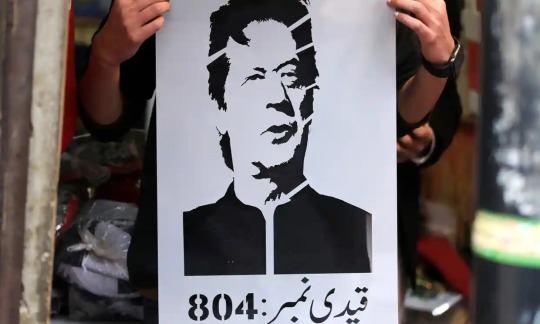
A vendor holds a picture of the jailed Former Prime Minister Imran Khan in Peshawar, Pakistan. Photograph: Bilawal Arbab/EPA
The script seems eerily familiar. Imran Khan, once the golden boy of Pakistan’s Corrupt Powerful Military Establishment, found himself at the receiving end of not one, but two, damning court verdicts this week.
Sentenced to 10 years in jail on Tuesday, and 14 years on Wednesday, the brazen timing of the convictions in two separate cases made one thing abundantly clear: the military will stop at nothing to keep Khan away from Pakistan’s general election, which will be held next week.
It was not so long ago that Khan himself benefited from these age-old tactics utilised repeatedly in Pakistan’s chequered political history. In 2018, when Khan was running for prime minister, it was the former prime minister Nawaz Sharif who had fallen out of grace with the military and found himself facing charges of corruption and being barred from office. Less than two weeks before the election in July 2018, Sharif was sentenced to 10 years in jail.
Now the tables have turned again. Khan has become the military’s harshest critic, confined behind bars, while a cowed Sharif has reconciled with the army generals and his path back to power has been cleared. As allegations of pre-poll rigging have abounded, Sharif is expected to be all but escorted into an election win.
Khan was already banned from running in the election, but the back-to-back convictions and hefty prison sentences speak to the strength of the military’s campaign against its former protege.
Since he was toppled from power in April 2022 – after a vote of no confidence widely acknowledged to have been orchestrated by the military – Khan’s criticisms of the army establishment and its tight control over Pakistani politics has been unprecedented.
Yet his campaign against the military was always doomed to fail given its iron grip, and since August, when Khan was finally arrested, it was made clear that the military would stop at nothing to sideline Khan and destroy his Pakistan Tehreek-e-Insaf (PTI) party.
Any pretence of due judicial process being followed was abandoned entirely at both cases where Khan was sentenced this week. Instead of an open courtroom, the trials were conducted inside the jail where Khan is being detained and his lawyers were not allowed to choose or cross-examine any witnesses.
Given the hefty crackdown on PTI in recent months, including all rallies being shut down by police and all coverage of the party largely banned from news channels, the party is a shadow of its former self, even if it still commands huge support from voters.
For many observers, Khan’s double convictions only serve to confirm that the elections are likely to be among the least credible in Pakistan’s recent history, pushing the country several steps back on its turbulent path towards democracy.
It is reflected too in the unusually muted political campaigning period. As the military has proved to be unafraid to show its hand in “managing” the election, even as it claims to be apolitical, all semblance of a fair fight has dissipated, with parties barely even putting forward a manifesto.
Among Pakistan’s voters, many of whom still revere Khan, there is a sense of anger and apathy. Yet most will echo the same refrain; in Pakistani politics, nothing ever really changes.
********
Imran Khan, Pakistan Former PM, Sentenced To 14 Years in Prison For Corruption (Politically Motivated Charges)
Ruling against Khan and wife Bushra Bibi comes just a day after a 10-year sentence was handed down, and just before Pakistan goes to the polls in a general election
— Hannah Ellis-Petersen, South Asia Correspondent | Wednesday 31 January 2024

Pakistan former prime minister Imran Khan and his wife, Bushra Bibi, has been sentenced to 14 years in jail on corruption charges. Photograph: Mohsin Raza/Reuters
Pakistan’s former prime minister Imran Khan has been sentenced to 14 years in jail in a corruption case, a day after he was given a 10-year sentence for leaking state secrets.
Khan’s wife, Bushra Bibi, was also handed a 14-year sentence in the case, known as Toshakhana, which accused them both of illegally selling state gifts. The judge also banned them both from holding political office for 10 years.
The sentence, given at a hearing held in the Rawalpindi prison where Khan, 71, is being held, further worsens the plight of the beleaguered former prime minister, who has been in jail since August and is facing more than 100 different charges.
The judge had denied Khan’s lawyers’ request to cross-examine witnesses in the trial and his lawyers were not present on Wednesday, when the sentence was given.
Khan questioned why there was an apparent rush to wrap up the case. “Why are you in a hurry to announce the verdict? I have not even recorded my final statement,” he told the judge, before exiting the courtroom. The verdict was then given without either Khan or Bibi present.
Bibi surrendered to the authorities at Adiala Jail in Rawalpindi on Wednesday morning.
The Toshakhana verdict came a day after a special court, also held in prison, found Khan guilty of leaking state secrets in relation to a sensitive diplomatic cable that allegedly went missing in his possession. Khan had described the trial as a sham and lawyers said he would be appealing against the verdict.
The timing of both consecutive convictions was deemed as significant by observers, coming a week before Pakistan goes to the polls in its long-delayed general election. Though Khan is already banned from running, he remains hugely popular among voters.
This is Khan’s second sentencing in the Toshakaha case, which related to allegations that the former prime minister bought several gifts given by rulers and government officials at low prices and sold them on for an undeclared profit. Khan had denied all wrongdoing.
The anti-corruption watchdog alleged that Khan and his wife had received 108 gifts from heads of state and foreign officials, some worth millions of rupees, during his term as prime minister and that many had been illegally kept or sold by the pair.
Khan was initially given a three-year sentence in the case in August, but after a higher court threw out the judgment, the legal proceedings began again after investigators presented fresh evidence relating to jewellery given by the Saudi crown prince and allegedly kept by Khan and his wife.
On Wednesday, the judge issued an even more severe sentence against both Khan and his wife, which included a collective fine of 787m rupees ($2.8m).
Khan, who was toppled from power in 2022, has claimed that the mounting cases against him are politically motivated.
Since he was removed from office in a vote of no-confidence, Khan began to publicly criticise the country’s powerful military, who have long been accused of meddling in politics. He alleged the military leadership bore a “grudge” against him and were orchestrating his imprisonment so he could not run in the elections.
Khan’s party, Pakistan Tehreek-e-Insaf (PTI), has also faced harassment and intimidation, with senior leadership imprisoned or put under pressure to leave the party, while workers have been prevented from campaigning or holding political rallies in the buildup to the election.
A statement by PTI on X after Wednesday’s verdict said Khan and Bibi had faced “yet another kangaroo trial in which no right to defence was given to both”.
The party said there had been a “complete destruction of every existing law in Pakistan in two days”.
#Pakistan 🇵🇰 | One & Only and Legend of Legends: Imran Khan | South and Central Asia | Analysis#Corrupt Pakistani Military#Corrupt to their Cores Army Generals#Hannah Ellis-Petersen#The Guardian USA 🇺🇸
2 notes
·
View notes
Text
The Slave Dancer (1974)
A review quote on the back of this book called it "horrifying," and that word is 110% accurate in describing my reading experience. I had to look up from time to time just to mentally process what I had just read.
The Slave Dancer is banned in virtually all school districts, and I certainly never saw it on any classroom shelf. It depicts in vivid detail the grotesque conditions of a boat heading to and from Africa to take a group of 98 slaves to America in the mid-1800s. The main character Jessie is kidnapped and forced to play his fife for the slaves each day to keep them active so their muscles don't atrophy over the course of the four-month journey. They're forced to do a kind of shuffle-dance in their chains, and if they don't move fast enough, they get whipped by a cat-o'-nine — a whip with nine knotted "tails." Both the crew and the slaves are subjected to the cat-o'-nine if they don't do what they're told (blah blah something about symbolism and how even the slavers are slaves to the industry...).
Jessie says, "I saw the others regarded the slaves as less than animals, although having a greater value in gold." The crew jam-packs the ship with so many slaves that there is nowhere for them to move. (I have memories of cramming into a crowded PRT car at WVU at the last minute, taking shallow breaths to avoid breathing in someone's body odor or too-strong perfume that's taken over the entire car — I'm imagining that discomfort tenfold.) There's so little space that many of the slaves afflicted with dysentery can't even make it to the latrine buckets fast enough because there are just too many people to get past.
Each day some of the crew tosses dead bodies overboard, with even some still alive if they're thought to be sick and spreading illness. Jessie notices a very young girl who makes a scene upon boarding the ship. She dies only a few days into the journey: "[Stout] held her upside down, his fingers gripping one thin brown ankle. Her eyes were open, staring at nothing. Foam had dried about her mouth. With one gesture, Stout flung her into the water." Jessie protests and is slapped by one of the crew in return.
There was one scene that I think will stick with me for a very long time. Ben Stout, one of the crewmembers in charge of the slaves (and whom Jessie feels is a truly evil man), drops Jessie's fife down into the slaves' hold and forces him to go retrieve it as a kind of sick punishment.
"I caught sight of a black face turned up toward the light. The man blinked his eyes, but there was no surprise written on his face. He had only looked up to see what was to befall him next. I went down the rope knowing my boots would strike living bodies. There was not an inch of space for then to move to. I sank down among them as though I had been dropped into the sea. I heard groans, the shifting of shackles, the damp sliding whisper of sweating arms and legs as the slaves tried desperately to curl themselves even tighter. ... To search the hold meant I would have to walk upon the blacks."
I can't even imagine the smell. For four months, day after day, week after week, with friends and family members who couldn't survive the trip simply being tossed overboard each morning... There's no way to comprehend the scale of that tragedy today, and nothing we experience in the U.S. could even come close.
At the end of the book, the crew sees a rival ship that could board and arrest them for being part of the slave trade, so the crew starts throwing the chained slaves overboard right and left to destroy the evidence. To top it off, a storm devastates the boat immediately after. Only Jessie and a single slave boy survive; every other slave and crewmember has either drowned or been killed. Jessie makes it home, but he lives with the memory of those months for the rest of his life. As a result, he can no longer tolerate hearing music of any kind.
This book reminded me a lot of the Studio Ghibli movie Grave of the Fireflies. It's a movie I think everyone should watch at some point in their life, but only once — no one would ever watch it a second time for fun. It's about two young siblings trying to survive alone in WW2-era Japan, and ultimately they both slowly starve to death. (Cinema Therapy's review of this movie examines it in depth if you're looking for a summary/don't want to submit yourself to the trauma of watching the whole thing.)
It's an important story that shouldn't be forgotten, but not for its entertainment value. My takeaway is that I think historical fiction has equal value to real history, in some cases, because it's able to humanize the past. Reading "many slaves did not survive the journey to America" in a textbook is just not the same as reading a description of a dead child being flung overboard by her ankle.
I don't know how this book fits into the larger conversation around banned books. This is a work I don't think someone under 13 should read, and even that's pushing it. I believe kids can handle a lot more than we give them credit for, but this was too much.
5/10 for the sheer devastation this brought, and I don't think I can give a Recommendable/Not Recommendable rating because it's in the same place as Grave of the Fireflies: the "this is important to preserve and talk about, but not fun in the slightest and will stay in your head in some capacity for the rest of your life" category.
#booklr#books#currently reading#newbery#newberyaward#newberymedal#reading#books and reading#the slave dancer
2 notes
·
View notes
Text
October 20th, 1872: mischief in Mumbay
(This is the third post today. First post, second post)
The passengers of the “Mongolia” went ashore at half-past four p.m.; at exactly eight the train would start for Calcutta.
Mr. Fogg, after bidding good-bye to his whist partners, left the steamer, gave his servant several errands to do, urged it upon him to be at the station promptly at eight, and, with his regular step, which beat to the second, like an astronomical clock, directed his steps to the passport office. As for the wonders of Bombay—its famous city hall, its splendid library, its forts and docks, its bazaars, mosques, synagogues, its Armenian churches, and the noble pagoda on Malabar Hill, with its two polygonal towers—he cared not a straw to see them. He would not deign to examine even the masterpieces of Elephanta, or the mysterious hypogea, concealed south-east from the docks, or those fine remains of Buddhist architecture, the Kanherian grottoes of the island of Salcette.
Having transacted his business at the passport office, Phileas Fogg repaired quietly to the railway station, where he ordered dinner. Among the dishes served up to him, the landlord especially recommended a certain giblet of “native rabbit,” on which he prided himself.
Mr. Fogg accordingly tasted the dish, but, despite its spiced sauce, found it far from palatable. He rang for the landlord, and, on his appearance, said, fixing his clear eyes upon him, “Is this rabbit, sir?”
“Yes, my lord,” the rogue boldly replied, “rabbit from the jungles.”
“And this rabbit did not mew when he was killed?”
“Mew, my lord! What, a rabbit mew! I swear to you—”
“Be so good, landlord, as not to swear, but remember this: cats were formerly considered, in India, as sacred animals. That was a good time.”
“For the cats, my lord?”
“Perhaps for the travellers as well!”
After which Mr. Fogg quietly continued his dinner. Fix had gone on shore shortly after Mr. Fogg, and his first destination was the headquarters of the Bombay police. He made himself known as a London detective, told his business at Bombay, and the position of affairs relative to the supposed robber, and nervously asked if a warrant had arrived from London. It had not reached the office; indeed, there had not yet been time for it to arrive. Fix was sorely disappointed, and tried to obtain an order of arrest from the director of the Bombay police. This the director refused, as the matter concerned the London office, which alone could legally deliver the warrant. Fix did not insist, and was fain to resign himself to await the arrival of the important document; but he was determined not to lose sight of the mysterious rogue as long as he stayed in Bombay. He did not doubt for a moment, any more than Passepartout, that Phileas Fogg would remain there, at least until it was time for the warrant to arrive.
Passepartout, however, had no sooner heard his master’s orders on leaving the “Mongolia” than he saw at once that they were to leave Bombay as they had done Suez and Paris, and that the journey would be extended at least as far as Calcutta, and perhaps beyond that place. He began to ask himself if this bet that Mr. Fogg talked about was not really in good earnest, and whether his fate was not in truth forcing him, despite his love of repose, around the world in eighty days!
Having purchased the usual quota of shirts and shoes, he took a leisurely promenade about the streets, where crowds of people of many nationalities—Europeans, Persians with pointed caps, Banyas with round turbans, Sindes with square bonnets, Parsees with black mitres, and long-robed Armenians—were collected. It happened to be the day of a Parsee festival. These descendants of the sect of Zoroaster—the most thrifty, civilised, intelligent, and austere of the East Indians, among whom are counted the richest native merchants of Bombay—were celebrating a sort of religious carnival, with processions and shows, in the midst of which Indian dancing-girls, clothed in rose-coloured gauze, looped up with gold and silver, danced airily, but with perfect modesty, to the sound of viols and the clanging of tambourines. It is needless to say that Passepartout watched these curious ceremonies with staring eyes and gaping mouth, and that his countenance was that of the greenest booby imaginable.
Unhappily for his master, as well as himself, his curiosity drew him unconsciously farther off than he intended to go. At last, having seen the Parsee carnival wind away in the distance, he was turning his steps towards the station, when he happened to espy the splendid pagoda on Malabar Hill, and was seized with an irresistible desire to see its interior. He was quite ignorant that it is forbidden to Christians to enter certain Indian temples, and that even the faithful must not go in without first leaving their shoes outside the door. It may be said here that the wise policy of the British Government severely punishes a disregard of the practices of the native religions.
Passepartout, however, thinking no harm, went in like a simple tourist, and was soon lost in admiration of the splendid Brahmin ornamentation which everywhere met his eyes, when of a sudden he found himself sprawling on the sacred flagging. He looked up to behold three enraged priests, who forthwith fell upon him; tore off his shoes, and began to beat him with loud, savage exclamations. The agile Frenchman was soon upon his feet again, and lost no time in knocking down two of his long-gowned adversaries with his fists and a vigorous application of his toes; then, rushing out of the pagoda as fast as his legs could carry him, he soon escaped the third priest by mingling with the crowd in the streets.
At five minutes before eight, Passepartout, hatless, shoeless, and having in the squabble lost his package of shirts and shoes, rushed breathlessly into the station.
Fix, who had followed Mr. Fogg to the station, and saw that he was really going to leave Bombay, was there, upon the platform. He had resolved to follow the supposed robber to Calcutta, and farther, if necessary. Passepartout did not observe the detective, who stood in an obscure corner; but Fix heard him relate his adventures in a few words to Mr. Fogg.
“I hope that this will not happen again,” said Phileas Fogg coldly, as he got into the train. Poor Passepartout, quite crestfallen, followed his master without a word. Fix was on the point of entering another carriage, when an idea struck him which induced him to alter his plan.
“No, I’ll stay,” muttered he. “An offence has been committed on Indian soil. I’ve got my man.”
Just then the locomotive gave a sharp screech, and the train passed out into the darkness of the night.
The train had started punctually. Among the passengers were a number of officers, Government officials, and opium and indigo merchants, whose business called them to the eastern coast. Passepartout rode in the same carriage with his master, and a third passenger occupied a seat opposite to them. This was Sir Francis Cromarty, one of Mr. Fogg’s whist partners on the “Mongolia,” now on his way to join his corps at Benares. Sir Francis was a tall, fair man of fifty, who had greatly distinguished himself in the last Sepoy revolt. He made India his home, only paying brief visits to England at rare intervals; and was almost as familiar as a native with the customs, history, and character of India and its people. But Phileas Fogg, who was not travelling, but only describing a circumference, took no pains to inquire into these subjects; he was a solid body, traversing an orbit around the terrestrial globe, according to the laws of rational mechanics. He was at this moment calculating in his mind the number of hours spent since his departure from London, and, had it been in his nature to make a useless demonstration, would have rubbed his hands for satisfaction. Sir Francis Cromarty had observed the oddity of his travelling companion—although the only opportunity he had for studying him had been while he was dealing the cards, and between two rubbers—and questioned himself whether a human heart really beat beneath this cold exterior, and whether Phileas Fogg had any sense of the beauties of nature. The brigadier-general was free to mentally confess that, of all the eccentric persons he had ever met, none was comparable to this product of the exact sciences.
Phileas Fogg had not concealed from Sir Francis his design of going round the world, nor the circumstances under which he set out; and the general only saw in the wager a useless eccentricity and a lack of sound common sense. In the way this strange gentleman was going on, he would leave the world without having done any good to himself or anybody else.
An hour after leaving Bombay the train had passed the viaducts and the Island of Salcette, and had got into the open country. At Callyan they reached the junction of the branch line which descends towards south-eastern India by Kandallah and Pounah; and, passing Pauwell, they entered the defiles of the mountains, with their basalt bases, and their summits crowned with thick and verdant forests. Phileas Fogg and Sir Francis Cromarty exchanged a few words from time to time, and now Sir Francis, reviving the conversation, observed, “Some years ago, Mr. Fogg, you would have met with a delay at this point which would probably have lost you your wager.”
“How so, Sir Francis?”
“Because the railway stopped at the base of these mountains, which the passengers were obliged to cross in palanquins or on ponies to Kandallah, on the other side.”
“Such a delay would not have deranged my plans in the least,” said Mr. Fogg. “I have constantly foreseen the likelihood of certain obstacles.”
“But, Mr. Fogg,” pursued Sir Francis, “you run the risk of having some difficulty about this worthy fellow’s adventure at the pagoda.” Passepartout, his feet comfortably wrapped in his travelling-blanket, was sound asleep and did not dream that anybody was talking about him. “The Government is very severe upon that kind of offence. It takes particular care that the religious customs of the Indians should be respected, and if your servant were caught—”
“Very well, Sir Francis,” replied Mr. Fogg; “if he had been caught he would have been condemned and punished, and then would have quietly returned to Europe. I don’t see how this affair could have delayed his master.”
25 notes
·
View notes
Note
What is that one scene that you’ve always wanted to write but can’t be arsed to write all of the set-up and context it would need? (consider this permission to write it and/or share it anyway) 🌼
Oh, lord, so many, I usually base any new story ideas off of One Specific Scene That Needs Way Too Much Setup To Make Sense and then start the project and then get distracted or tired or sick, oops.
In Thayet Trevelyan's continuity, I have a bunch. One that's been around the longest is the first real confrontation that Thayet and Cullen have in Haven, and it lives in my head as part of a multi-chapter, Cullen POV fic detailing his history with her and his relationship with her up until, like... sometime in the early days of the Inquisition in Skyhold?
Basically, they meet when they're young because they train at the same monastery (Cullen is canonically 13 when he starts, but I might exercise creative license on that and bump him down to 10 or 11) and Thayet sort of adopts him, being a couple years older and having been there longer, but she leaves before the uprising and they end up leading parallel sorts of lives in Ostwick and Kirkwall (both of them rising quickly to Knight-Captain and having close-but-complicated relationships with their Knight-Commanders, and meeting once in the middle of it all and clashing hard in a fight that gives Cullen the scar on his mouth).
By the time they meet in Haven, Cullen is doing what Cullen does, and Thayet is infamous among Templars for turning on them in support of the mages and killing a bunch of Knights in the process. Cullen had known for years that she was some kind of a smuggler and had been previously punished for the accusation, so he thinks she's this duplicitous, murdering criminal (and he's kind of not wrong), and Thayet thinks of Cullen as willfully complicit in the abuse of the mages and Meredith's rise to power, if not an active participant in it (and she's not really wrong, either).
Their friendship had always been kind of volatile in a sibling-like sort of way as teenagers, they'd physically fought in Kirkwall years before, and in Haven, they have a brand new confrontation and an absolute disdain for being forced to work together; he can't have her arrested because of the mark, she can't get rid of him because she's not in charge, and neither of them is in a place where they're ready to hear the other one out. And at this point in Cullen's perspective, Thayet is an antagonist, if not an outright villain, as he fully believes that she was at the Conclave for nefarious reasons and might legitimately be responsible for the explosion. (Partly because of the trauma of another significant explosion, you know how it is.) She doesn't do much to convince him otherwise, either, being at the time in deep mourning for her recently-deceased brother, whom Cullen physically resembles, and who Cullen didn't know existed in the first place.
It's very messy and requires at least 3 or 4, even 5 scenes to be written ahead of it that take place before Inquisition even starts. And I'm tired lol
#asks#ir0n-angel#ask meme#my writing#dragon age#dai#cullen rutherford#my ocs#thayet trevelyan#the inquisitor
4 notes
·
View notes
Text
Thought some of you might enjoy this analogy that we talked about in church today <3
(From a speech given by Elder Paul V. Johnson on Oct 1, 2022)
"Our Heavenly Father and our Savior, Jesus Christ, have the power to save us and transform us. They can help us become as They are.
"A few years ago, one of our young grandsons, Aaron, began having health problems. He became fatigued, had quite a bit of bruising, and did not look healthy. After medical testing, he was diagnosed with severe aplastic anemia, a disease where his bone marrow stopped producing red blood cells, white blood cells, and platelets. Without treatment and an eventual cure, his blood could not clot properly or fight off infections, so even minor falls, injuries, or illnesses could quickly become life-threatening.
"For a period of time, Aaron received regular platelet and blood transfusions to keep him out of danger. The doctors explained that the only cure for the disease would be a bone marrow transplant, and the best chance for success would be to have a sibling as the donor. If one of his siblings were an ideal match, the outcome of the transplant could be lifesaving. His four younger brothers were tested, and one, Maxwell, was deemed a perfect match.
"Even with a perfect donor match, a bone marrow transplant still poses a serious risk of complications. The process required that Aaron’s own cells in his diseased bone marrow be destroyed by a combination of chemotherapy and radiation before receiving the stem cells from his brother Maxwell’s bone marrow. Then because of Aaron’s compromised immune system, he needed to be isolated in the hospital for several weeks and then at home for several months with special protocols, restrictions, and medications.
"The hoped-for outcome from the transplant was that Aaron’s body would not reject the donor cells and that Maxwell’s cells would gradually produce the needed red and white blood cells and platelets in Aaron’s body. A successful donor transplant causes a very real physiological change. Amazingly, a doctor explained that if Aaron committed a crime and left blood at the crime scene, the police could arrest his brother Maxwell. This is because Aaron’s blood would come from Maxwell’s transplanted cells and have Maxwell’s DNA, and this would be the case for the rest of his life.
"Aaron being saved by his brother’s blood has spurred many thoughts about the atoning blood of Jesus Christ and the effect of His Atonement on us. I would like to focus today on the permanent, life-giving change that occurs as we allow the Lord to work miracles in us.
"Aaron did not have the power in himself to overcome the disease. His body could not make the blood cells needed to sustain his life. No matter what he personally did, he could not heal his bone marrow. Just as Aaron could not cure himself, we cannot save ourselves. No matter how capable, educated, brilliant, or strong we are, we cannot cleanse ourselves from our sins, change our bodies to an immortal state, or exalt ourselves. It is only possible through the Savior Jesus Christ and His infinite Atonement. “There is none other way nor name given under heaven whereby man can be saved in the kingdom of God" (2 Nephi 31:21). It is His atoning blood that cleanses us and sanctifies us.
....
"We are children of God with a majestic destiny. We can be changed to become like Him and have “a fulness of joy” (Doctrine and Covenants 93:33). Satan, on the other hand, would have us be miserable like he is. We have the ability to choose whom we follow. When we follow Satan, we give him power. When we follow God, He gives us power.
....
"Can you imagine how overwhelming it would have been for our young grandson Aaron to assume he had to understand and perform all the medical procedures associated with his transplant himself? We should not assume we need to do what only the Savior can do in the miraculous process of our perfection.
"As Moroni concluded his record, he taught, “Yea, come unto Christ, and be perfected in him, … and if ye shall deny yourselves of all ungodliness, and love God with all your might, mind and strength, then is his grace sufficient for you, that by his grace ye may be perfect in Christ” (Moroni 10:32). What a comforting and powerful truth! His grace is sufficient for me. His grace is sufficient for you. His grace is sufficient for all who “labour and are heavy laden" (Matthew 11:28).
"With medical treatments like Aaron’s, there is always some uncertainty of the outcome. In fact, Aaron needed a second transplant when the first one had complications. Thankfully, with a spiritual change of heart, we don’t have to wonder if it will happen. When we live according to His will, “relying wholly upon the merits of him who is mighty to save,” (2 Nephi 31:19) there is a 100 percent guarantee of being cleansed by the Savior’s blood and eventually being perfected in Him. He is “a God of truth, and [cannot] lie" (Ether 3:12).
"There is no question that this process of change takes time and will not be completed until after this life, but the promise is sure. When the fulfillment of God’s promises seems far off, we still embrace those promises, knowing they will be fulfilled.
"The miraculous change in Aaron’s health has brought great joy to our family. Imagine the great joy in heaven as mighty changes happen in our souls."
3 notes
·
View notes
Quote
‘Beloved Osho, from your talks I understand that there is some kind of evolutionary process that happens. But I have also heard you say that man has not evolved at all. Where are all the seekers who died enlightened?’
Man as a collectivity has not evolved. Whatever little bit of humanity has happened to the collective mass is because of those few seekers who became enlightened. But you should understand the proportion. It is like a spoonful of sugar you drop in the ocean to make it sweet; it is not going to do much to the ocean. The ocean is too vast. A spoonful of sugar was perfectly good for a cup of tea, but it is not good for the ocean. An enlightened man is a cup of tea. Even his group—those who become attuned with him—are still so small that they cannot make much change in the collective mass, in its vast darkness, unconsciousness. But in thousands of years so many people have become enlightened that a little bit of change in humanity you can see. But the credit does not go to man—that’s why I say man has not evolved. The credit goes to those few enlightened people. They simply disperse their consciousness in this ocean—but they cannot make it sweet. It has a little effect, but so small that it is negligible. The credit goes to those few people who lived and died to help humanity. And the same humanity for whom they lived, kills them, crucifies them. It cannot do otherwise, its darkness is such.
Some slight changes can be traced, but they are so slight that they are not worth mentioning. For example, they could crucify Jesus without any feeling of guilt. In fact they felt relieved that this nuisance is finished. He was becoming more and more a torture to their tradition, to their orthodox mind. They felt light. They cannot crucify me that easily—this is the slight change. They may prevent me from coming into a country, they may prevent me from staying in a country, they may arrest me and throw me out of a country, they may destroy my communes. They may in every way harass my people, but still they cannot crucify me. A slight change has happened. They feel ashamed. They would have liked to; still deep down they would have liked to. That would be simpler. Rather than all the parliaments of the world deciding against me, and every government informing other governments… why make it such a complex thing? But they feel that if I am crucified they will not be able to feel light or unburdened or relieved; in fact they may feel guilty. These are the changes that in the long run will help man, but the credit goes to those few people who sacrificed everything, sacrificed their lives in the service of this humanity. And this humanity has paid them back with crucifixion and poison and stoning them to death. Still they died with a smile.
Mansoor’s crucifixion is remarkable. It was far more barbarous than Jesus’ crucifixion because they cut off each of his limbs slowly. They cut off his legs, they cut off his hands, they took out his eyes. They tortured him as no man has ever been tortured, and still he smiled.
One man in the crowed asked, ‘Mansoor, why are you smiling?’ And he said, ‘I am smiling because these people are killing a person who was trying to give them more life, more light. But these people are strange—they are killing their own friend. And I am also smiling because they don’t know that by destroying my body they cannot destroy me. They are killing somebody else! So Mansoor is laughing.’
And while all this was going on—people were throwing stones, rotten eggs, just to humiliate Mansoor—his own master, Junnaid, was present in the crowd. And just not to be seen as not being with the crowd, Junnaid also threw something—a flower. He knew Mansoor: Mansoor was his disciple, and he knew he was right.
Junnaid had been telling him, ‘You are right, but don’t say it. Don’t declare: ‘I myself am the ultimate truth. There is no other god; everybody is carrying his god within himself.’ Don’t say it! I know it, but I have remained quiet because my master said, ‘Keep your mouth shut; otherwise they will simply kill you. So what is the point?’ ‘Mansoor said, ‘I have been trying not to say it, but what to do? People ask questions and I forget, and what is real comes out.’
So Junnaid was sad. He was serving two purposes by throwing a beautiful rose. First, the masses would think that he is also throwing stones or rotten eggs. In that crowd who knows what is thrown by whom? Secondly, Mansoor will be able to understand that a roseflower has hit his face and that it cannot be from anybody else than his master. Only he can understand. But at that moment tears came to Mansoor’s eyes, the smile disappeared. Again somebody asked, ‘Just now you were smiling, and now there are tears. What has happened?’ He said, ‘Something has happened. The people who were throwing stones, rotten eggs, tomatoes, bananas and all kinds of things—that was okay. They don’t understand. But somebody has thrown a roseflower. I know who he is. His roseflower hurts me more than anything else because although he knows what is true, he is not courageous enough to declare it. These tears are for his uncourageous, disgraceful behavior.’
So these people have raised human consciousness a little bit—but the whole credit goes to them. Man cannot behave that way now, today. You cannot do the same to me as you did to al-Hillaj Mansoor just one thousand years ago. Even the people who are against me, in private they are not against me; they are against me because the masses are against me. Now, here again the same question arises: they want me to stay here, but the problem is who is going to sign the papers? The president is willing for me to stay here, but he does not want to take the responsibility of signing the papers. The foreign minister is afraid, and the minister of the interior is afraid. He is willing… it is absolutely right, there is no problem: I should stay here. But how can I stay here? Nobody is ready to take the responsibility. They have their fears. If something happens tomorrow, then that person will be caught; then his political career will be lost. The foreign minister is supported by the American government to be chosen as secretary-general of the U.N. Now he wants me to be here but he cannot sign, because if he signs his career is finished. Then he cannot be the secretary-general of the U.N. These people have changed. At least, as far as they are concerned, they are ready to accept me here; just they don’t want to take the responsibility wholly on themselves. That much courage is not in them. But this is also a development. Perhaps somebody may gather courage, risk his ambitions or politics. It is risky, because once anybody signs papers then the whole force of the American government and the Spanish government and the German government will be used to throw that man out. That man should not remain in the ministry because he did not listen to all these governments’ advice and he went against them. And the people who are all saying yes, in such a situation will say, ‘We had warned you before. You did not listen.’
So there has been a little development, but not much. And the credit is not for the masses themselves. They have not made any progress, any evolution. These are just by-products of a few unique individuals who lived like flames and left their mark on human consciousness. But human consciousness is such a vast, oceanic field that it will take thousands of years for it to evolve in this way. That’s why my effort is not to work with too many people, but to concentrate on a limited number of people with such intensity that they all become enlightened in this life. Perhaps a group of two hundred people becoming enlightened at the same time may give a great push to human evolution. We can just try. And it is such a joy, such an excitement, to try it.
I don’t think that al-Hillaj Mansoor was angry. He could understand that what these people are doing is perfectly expected.
I am not angry: whatever is being done against me is perfectly expected.
But this is how evolution happens, very slowly. Existence has no hurry in any way. Eternity is available.
We think in terms of time; existence has no time limit. That’s why we become a little worried about why evolution is not happening—because our time scale is very small. Looking at existence’s eternity… our time cannot even be equal to seconds.
So there is nothing to be worried about. Changes are happening, and perhaps the days ahead are going to be very, very dangerous. Man may have to change in spite of himself. The nuclear war is a great hope—not in the sense that it happens, but that it creates the situation in which man has to change. Otherwise war is going to happen. Perhaps this big humanity needs such a dangerous situation just in order to change; otherwise it cannot change. That situation is coming closer, and we are fortunate that we have reached here at the right time.
Osho (The Path of Mystic)
#osho#evolution#awakening#enlightenment#crowd#mansoor#crucifixion#collective#change#apocalypse#danger#humanity#jesus#enlightened person#lbotca
2 notes
·
View notes
Text
Treasure Island reimagined as a fantasy swashbuckler epic
On Martha’s Vineyard in the 1700s, Jim Hawkins and his friend Robert, or “Rob”, whilst helping Jim’s widowed mother run the Benbow Inn, listen to Billy Bones' tales about the late pirate Captain Flint, who buried his treasure trove on a remote island inhabited by monsters. Among this treasure is the legendary Starstone, a magic crystal which is said to lift curses. The boys have grown tired of a life of monotony and seek adventure. One day, Bones’ former shipmate Black Dog appears at the inn to confront him about a chart, but Bones forces him to flee. Later that night, pirate Blind Pew arrives, gives Bones the Black Spot and leaves. Bones gives Jim a book containing a treasure map and begs the boys to go after the treasure and keep both it and the map safe from pirate hands, especially a one-legged man, before succumbing to cardiac arrest. Shortly after Bones's death, a gang of pirates attack the Benbow Inn, burning it to the ground. Jim, Rob and Mrs. Hawkins escape and take the book to local physician Dr. Livesey and Squire Trelawney, the latter of whom arranges a voyage to find the treasure, under the pretense of going to collect specimens of local wildlife, so that they may gain the funds to rebuild the Benbow Inn, with Jim and Rob serving as cabin boys. Trelawney procures the ship Hispaniola, hires Captain Smollett, and with the help of peg-legged publican Long John Silver, whom Jim suspects is the man he was warned about, gathers a crew of sailors. The ship sets sail, but Smollett is suspicious of the crew, believing them to be of shady character; Indeed, Silver secretly leads the motley bunch, many of them pirates who had served on Captain Flint's ship, the Walrus. Jim and Rob are sent down to work in the galley, where they are supervised by Silver and his talking parrot, “Cap’n” Enola Flint, to prevent Jim discovering the crew's mutinous intentions. Despite the boys’ initial mistrust of Silver, they soon form a tenuous father-son relationship. The crew suffers tragedy when first mate Mr. Arrow is killed during a kraken encounter. However, Silver and Enola know that Mr. Arrow was sacrificed to the beast by Israel Hands and George Merry. As the ship reaches the island, Jim and Rob overhear the crew and soon discover they are indeed pirates planning a mutiny and inform Livesey, Trelawney, and Smollet, who secretly plan their own offensive. Smollett allows some of the crew to go ashore, so there are fewer mutineers on the Hispaniola to deal with. Jim and Rob sneak ashore to spy on Silver, taking Enola as a hostage in the process. The three meet Mina Gunn, Flint’s former cabin girl who had been marooned on the island and protected by the varied bizarre creatures there. Mina reveals that Enola was once Flint’s adopted daughter, whom a voodoo queen had cursed to become a parrot to punish him for his piratical ways. The mutineers arm themselves and take the ship while Smollett's group take refuge in an abandoned stockade on the island, where they reunite with Jim’s group. After Silver tries and fails to parley with Smollett and Jim for the map, the pirates storm the stockade, wounding the Captain, but are driven away. Enola escapes, but a stroke of her conscience forces her to return to help Jim, Rob and Mina as they use Mina’s boat to make their way back to the Hispaniola. Along the way, Enola reveals that she and Silver seek the Starstone to restore her human form. After they cut the ship's anchor rope, Hands, who is guarding the ship, agrees to help them beach the Hispaniola, then attempts to stab them in the back. As the ship runs aground, the four scatter; Jim flees into the shrouds, managing to shoot Hands, who falls into the water and is finished off by the mermaids dwelling around the island. Jim’s group return to the stockade to find the others gone and the mutineers there instead. Enola stands up to Silver, bravely admitting the four have caused most of the pirates’ problems, and Silver is nearly deposed by Merry, but reveals he bargained with Livesey for the map - seeing the treasure map, the pirates return to Silver's side and decide to keep the youths alive. The next day, Livesey comes to treat some of the pirates, and the quartet confide to him about the Hispaniola, Jim saying that he and his friends owe their lives to Silver. Livesey hurries back to tell the others, while the pirates set off with the map on a treasure hunt. They find that the cave in which Flint hid the treasure is empty, leading Merry to lead the pirates once more in rebellion against Silver, but they are ambushed by Smollett's men. The group engages the pirates in a sword fight, during which Silver saves Jim and Rob’s lives. After the group emerge victorious, the creatures of the island lead them to where they stashed the treasure after unearthing it. It’s also revealed that Mina has been unknowingly carrying the Starstone with her all along, set into her necklace; She uses it to return Enola to her human form. The group load the Hispaniola and set sail for home. While the pirates are imprisoned, Jim, Rob, Mina and Enola find Silver below decks about to escape his impending judgment. They allow him to go, and Silver promises to hunt treasure with them again some day.
2 notes
·
View notes